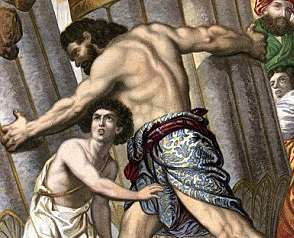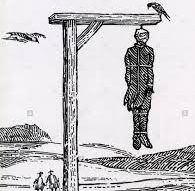"Then Reason berated me and said, 'Never trouble
At what I allow or do not allow; leave that to me!
Reason says that God made everything perfect, that God is not to be criticised. and that if something goes wrong it is because men can't control themselves. He has no answer to why an omnipotent God won't control them. He avoids the dodgy subject of free-will by saying that 'God did it, and God is always right, so shut up and mind your own business'.
The Dreamer then wakes from a dream-within-a-dream to hear a new character asking him whether he now knows the meaning of Do-Well. He is still smarting from the rebuke of Reason and his answer is that one aspect of Do-Well is humility.
"It means seeing much and suffering more!"
The nameless person points out that if had understood that earlier he could have learnt more from Reason and not been rejected. His undisciplined pursuit of knowledge is compared to that of Adam's desire 'to know God's purpose'.
"You wanted to be wiser than Reason as well.
Putting questions and quibbles that were quite inept,
So that Reason decided to cease his instruction.
Now you'll keep the company most probably of Pride
And Presumption instead of pursuing Learning."
The Dreamer accepts the rebuke and Langland gives us his own analogy of ignorant behaviour.
"If a drunken fool fall into the gutter,
Let him lie as he likes and never look to him.
If Reason rebukes him then, he recks nothing of him;
He accounts the counsel of Clergy as rushes.
To blame or beat him then were but time wasted."
It is better to wait till he has sobered up: then have a go. Having handed out criticism, the nameless character turns to leave, but The Dreamer follows to asks his name.
"'I am Imagination', he said, 'I am never idle.
Though I hold by myself in health and sickness,
I have followed you faithfully forty-five winters.
He seems to be saying that or all those years he has been quietly trying to make Langland think where his life style is leading, and amend it before it is too late.
"But you play at poetry when you should be praying
For the breakers of bread or saying your psalms.
There are dozens of books about Do-this and Do-that
And plenty of friars to explain finer points"
The dreamer defends himself with by claiming that Cato made a serious use of poetry and others, too;
"And that's how I behave and I've heard holy men
Are far more effective if they have some fun.
But if someone can discern the secrets of Do-Well
And endeavour to explain to me Do-better and Do-best
I'll cease my scribbling and skulk in the church
Unless sleeping or eating, reciting the psalms."
That earns him another lecture about about putting too much faith in such personal abilities as one has been given. He is shown what Do-Well looks like for two groups (married men and clerics). In contrast, a string of well-known people are listed as coming to grief because they trusted too much in their own gifts. Amongst these are Solomon (wisdom), Samson (strength), Alexander (military success) and Rosamund (beauty). Imagination recognises that there is value in native wit as well as in learning but makes a distinction between the source. If they are thought to have been acquired by human effort, they are suspect. If acknowledged as God-given they are OK. Imagination has a rather charming mixed metaphor.
"And as a blind man in battle with a weapon to fight
Has no luck with his axe to hit his enemy,
So a kind-witted man, unless clerks teach him,
Can't come for all that to Christendom and be saved."
Langland (speaking through Imagination) seems to define true learning as coming from the bible, and the fathers of the church whenever it has not been corrupted by ignorant priests or pride.
"While native wit stems from all sorts of sights,
From birds and beasts, from bliss and sorrow,
From fragments of experience. both factual and false."
Not to be missed is a spot of Langland venom when he refers to wise men coming to Bethlehem.
"And five shillings says no friar was found there."
Imagination interrupts the logic here to answer point that may, he thinks, have been worrying The Dreamer.
"Why have I been telling you all this? It's because I had
taken in how you kept on arguing against learning,
flinging sarcastic gibes."
The allegory of physical skill to illustrate spiritual discernment is repeated when The Dreamer is asked whether a person thrown into the Thames has a better chance of survival if he knows how to swim. This is quickly followed by the use of 'learning' in the very concrete sense of knowing a few words of Latin. This could enable a criminal to be tried by a church court which imposed lesser penalties.
"It has taken from Tyburn twenty bold thieves:
See how they're saved when others have swung."
In the next hundred lines the difference between learning and natural wit gives way to the admission that some things nobody knows. About the thieves on the cross:
"You may ask why one felon confessed his faith
While the other did not, but no one can know:
The question discomfits every Christian scholar."
About why it is creatures behave in a certain way, like some building nests on the ground and some in the air:
"Native wit and learning are left at a loss
Because none but nature knows the cause."
This list of unknowns extends into the matter of who will and who will not be saved, as Imagination and The Dreamer discuss a range of marginal cases including Aristotle, Socrates and Solomon. An argument based on the essential goodness of God says that a non-Christian who is faithful to his own god can somehow be saved.
"A true man who has never trespassed or betrayed
But lived by God's law and believed none better
Though willing if there were such to change his ways
Must be favoured for his faith by a faithful God."
This argument, as it moves back and forth, almost makes a reader forget that Will Langland wrote both parts. The final assertion accords with his rejection of a God so unjust that he will condemn any truly righteous soul. But this thought is put into the mouth of Imagination who then disappears abruptly.
"And instantly, he vanished."
THE DREAMER REBUKED BY IMAGINATION

LIVING WITH PRIDE AND PRESUMPTION

LET HIM LIE AS HE LIKES
PLENTYOF FRIARS TO EXPLAIN FINER POINTS
SAMSON PULLS DOWN PHILISTINE TEMPLE

OTHERS HAVE SWUNG

NONE BUT NATURE KNOWS THE CAUSE

TRUE MAN ACCORDING TO HIS BELIEFS. SAVED?
Langland reflects on what Imagination has told him and is then invited to a dinner party. Click DINNER PARTY to move on or HOME to get back to the beginning.